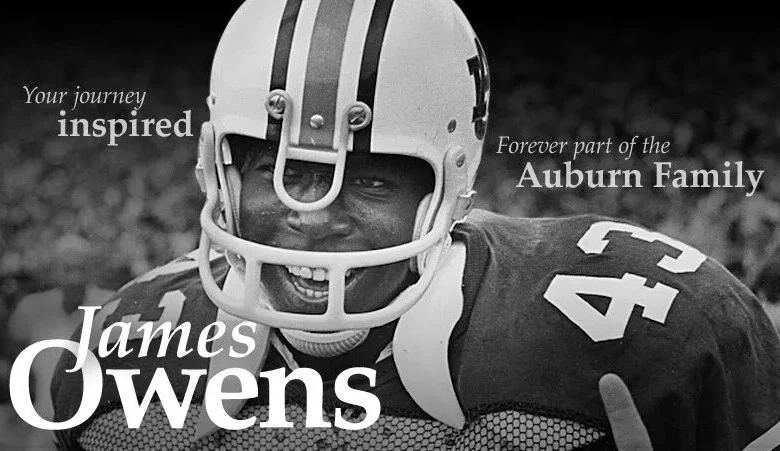Auburn’s James Owens holds a significant yet often overlooked place in Alabama’s history as the state’s first Black football player, highlighting a groundbreaking moment in sports and social progress.

The history of sports is often intertwined with the broader social and political struggles of the eras in which athletes have competed. Among these narratives, the story of James Owens stands out as a significant yet sometimes overshadowed chapter in Alabama’s history—a story of courage, resilience, and groundbreaking achievement as the state’s first Black football player at Auburn University. This narrative not only highlights Owens’s personal journey but also reflects the broader civil rights movement, societal change, and the ongoing quest for equality and inclusion in American sports and society.
1. The Context of Alabama and Segregation
To understand James Owens’s significance, it’s crucial to contextualize his achievements within the social fabric of Alabama during the mid-20th century. Alabama, a state with a complex history of racial segregation and civil rights struggles, was deeply divided along racial lines. The Jim Crow era enforced strict racial segregation in public facilities, including schools, transportation, and sports. Black athletes faced systemic barriers that prevented participation at many levels, especially in predominantly white institutions.
In this environment, the integration of sports teams was not merely a matter of athletic competition but also a symbol of social progress and racial equality. Breaking into white-dominated teams meant confronting entrenched discrimination, risking ostracism, and challenging societal norms.
2. James Owens’s Early Life and Path to Auburn
Born in 1948 in Alabama, James Owens grew up during a period of intense racial segregation and social upheaval. Despite the barriers, Owens developed a passion for football, demonstrating exceptional talent and determination from a young age. His dedication and skill eventually led him to Auburn University, a prominent institution in Alabama and a significant stage for his groundbreaking role.
Owens’s journey to Auburn was marked by resilience. At a time when Black athletes had limited opportunities in college sports, Owens’s acceptance onto the team was not just a personal achievement but a symbol of progress. His recruitment challenged the prevailing racial barriers and set a precedent for future integration efforts.
3. Owens’s Role as the First Black Football Player at Auburn
In 1969, James Owens became the first Black football player at Auburn University. His entry into the team was a pivotal moment, symbolizing a slow but vital shift towards racial integration in college athletics in Alabama. Owens’s presence on the team was revolutionary, representing hope and progress for many Black athletes who aspired to compete at the highest levels.
a. The Challenge of Integration
Owens’s integration into Auburn’s football program was met with both support and resistance. Some fans, teammates, and administrators embraced this historic step, recognizing its importance for equality and justice. Others, however, expressed hostility or skepticism rooted in racial prejudice.
Owens faced unique challenges—racial slurs, social isolation, and the pressure of representing an entire community’s hopes and struggles. Yet, he persisted, demonstrating resilience both on and off the field.
b. Athletic Contributions
Despite the societal challenges, Owens proved himself as a capable athlete, contributing to Auburn’s team performance and demonstrating that talent transcends race. His perseverance helped pave the way for future Black athletes at Auburn and in Alabama.
4. The Broader Significance of Owens’s Achievement
Owens’s participation was more than an athletic milestone; it was a social and cultural breakthrough. His role challenged stereotypes, dismantled racial barriers, and inspired a generation of Black athletes seeking opportunities in collegiate sports.
a. Civil Rights and Sports
His story intersects with the broader civil rights movement, illustrating how sports can serve as a platform for social change. Owens’s integration symbolized progress, emphasizing that sports institutions could be agents of racial equality.
b. Breaking Down Barriers
Owens’s success demonstrated that Black athletes could excel in predominantly white programs, challenging the pervasive notion of racial superiority and inferiority. His achievement contributed to the gradual desegregation of college sports in Alabama and beyond.
c. Cultural Impact
Owens’s story resonated beyond the football field, inspiring community pride and fostering conversations about racial justice, equality, and inclusion in sports and society.
5. Challenges Faced and Overcoming Adversity
The journey of James Owens was fraught with adversity. Facing hostility, prejudice, and the emotional toll of being a pioneer, Owens displayed remarkable courage.
a. Racial Hostility and Social Isolation
Owens’s integration into Auburn’s team was often accompanied by hostility from some fans and peers. Racial slurs, threats, and social exclusion were part of his daily reality. Yet, his resilience and focus on excellence helped him persevere.
b. Personal Sacrifices
Owens’s commitment to his sport often meant sacrificing social acceptance and enduring personal hardship. His ability to stay focused on his goals exemplifies strength and determination.
c. The Power of Support and Community
Despite the challenges, Owens found support in allies—coaches, teammates, and civil rights advocates—who recognized the importance of his role. Their backing provided crucial encouragement and validation.
6. Owens’s Legacy and Impact on Future Generations
While his playing career was relatively brief, Owens’s impact extended far beyond the gridiron.
a. Role Model and Trailblazer
Owens became a role model for Black youth and aspiring athletes, demonstrating that perseverance and talent could break down barriers. His story inspired future generations of Black football players and athletes in Alabama and across the nation.
b. Civil Rights Advocate
After his playing days, Owens remained involved in community efforts, advocating for racial equality and social justice. His leadership helped shape conversations about inclusion in sports and education.
c. Recognition and Memorialization
In recent years, efforts have been made to recognize Owens’s pioneering role, including honors, commemorations, and educational initiatives highlighting his contributions. Despite this, his story remains underrepresented in the broader narrative of Alabama’s civil rights history.
7. The Overlooked Nature of Owens’s Contributions
Despite his groundbreaking achievement, James Owens’s story has often been overshadowed by other civil rights figures and sports legends. This neglect reflects broader societal tendencies to overlook the contributions of Black pioneers in regional histories.
a. Reasons for Overshadowing
Factors include regional racial dynamics, historical marginalization of Black athletes, and the tendency to focus on more prominent figures nationally. Local histories and narratives sometimes fail to give Owens the recognition he deserves.
b. Importance of Preservation and Education
Highlighting Owens’s story is vital for understanding Alabama’s complex racial history and celebrating local heroes who challenged injustice. Promoting awareness fosters appreciation and acknowledgment of his contributions.
8. Continuing the Legacy: Lessons from James Owens
Owens’s journey offers enduring lessons for today’s society:
Courage in the Face of Adversity: His resilience shows the importance of perseverance amidst social challenges.
The Power of Representation: Breaking racial barriers inspires systemic change and promotes diversity.
The Role of Sports in Social Justice: Athletics can serve as catalysts for societal transformation, fostering inclusion and understanding.
Honoring a Trailblazer and His Unrecognized Legacy
James Owens’s story is a powerful testament to courage, perseverance, and the pursuit of equality. As Alabama’s first Black football player at Auburn, he broke racial barriers and challenged societal norms during a turbulent era. Yet, his contributions remain underappreciated in the broader historical narrative. Recognizing Owens’s role not only honors his legacy but also reminds us of the ongoing importance of social justice, inclusion, and the transformative power of sports. His story deserves to be celebrated, studied, and remembered as a vital chapter in Alabama’s history—a testament to the resilience of those who dare to challenge injustice and pave the way for future generations.









